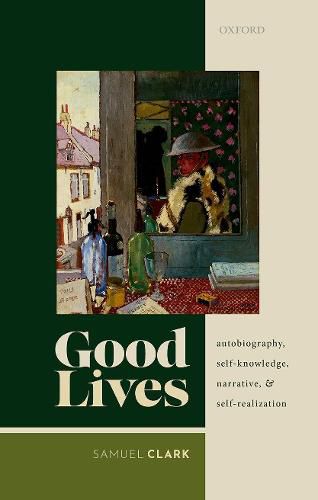Readings Newsletter
Become a Readings Member to make your shopping experience even easier.
Sign in or sign up for free!
You’re not far away from qualifying for FREE standard shipping within Australia
You’ve qualified for FREE standard shipping within Australia
The cart is loading…






Reasoning with autobiography is a way to self-knowledge. We can learn about ourselves, as human beings and as individuals, by reading, thinking through, and arguing about this distinctive kind of text. Reasoning with Edmund Gosse’s Father and Son is a way of learning about the nature of the good life and the roles that pleasure and self-expression can play in it. Reasoning with Siegfried Sassoon’s Memoirs is a way of learning about transformative experience, self-alienation, and therefore the nature of the self. Good Lives: Autobiography, Self-Knowledge, Narrative, and Self-Realization develops this claim by answering a series of questions: What is an autobiography? How can we learn about ourselves from reading one? On what subjects does autobiography teach? What should we learn about them? In particular, given that autobiographies are narratives, should we learn something about the importance of narrative in human life? Could our storytelling about our own lives make sense of them as wholes, unify them over time, or make them good for us? Could storytelling make the self?Samuel Clark provides an authoritative critique of narrative and a defence of a self-realization account of the self and its good. He investigates the wide range of extant accounts of the self and of the good life, and defends pluralist realism about self-knowledge by reading and reasoning with autobiographies of self-discovery, martial life, and solitude. The volume concludes by showing that autobiography can be reasoning in pursuit of self-knowledge; each of us is an unchosen, initially opaque, seedlike self; our good is the development and expression of our latent capacities, which is our individual self-realization; and self-narration plays much less role in our lives than some thinkers have supposed, and the development and expression of potential much more.
$9.00 standard shipping within Australia
FREE standard shipping within Australia for orders over $100.00
Express & International shipping calculated at checkout
Reasoning with autobiography is a way to self-knowledge. We can learn about ourselves, as human beings and as individuals, by reading, thinking through, and arguing about this distinctive kind of text. Reasoning with Edmund Gosse’s Father and Son is a way of learning about the nature of the good life and the roles that pleasure and self-expression can play in it. Reasoning with Siegfried Sassoon’s Memoirs is a way of learning about transformative experience, self-alienation, and therefore the nature of the self. Good Lives: Autobiography, Self-Knowledge, Narrative, and Self-Realization develops this claim by answering a series of questions: What is an autobiography? How can we learn about ourselves from reading one? On what subjects does autobiography teach? What should we learn about them? In particular, given that autobiographies are narratives, should we learn something about the importance of narrative in human life? Could our storytelling about our own lives make sense of them as wholes, unify them over time, or make them good for us? Could storytelling make the self?Samuel Clark provides an authoritative critique of narrative and a defence of a self-realization account of the self and its good. He investigates the wide range of extant accounts of the self and of the good life, and defends pluralist realism about self-knowledge by reading and reasoning with autobiographies of self-discovery, martial life, and solitude. The volume concludes by showing that autobiography can be reasoning in pursuit of self-knowledge; each of us is an unchosen, initially opaque, seedlike self; our good is the development and expression of our latent capacities, which is our individual self-realization; and self-narration plays much less role in our lives than some thinkers have supposed, and the development and expression of potential much more.